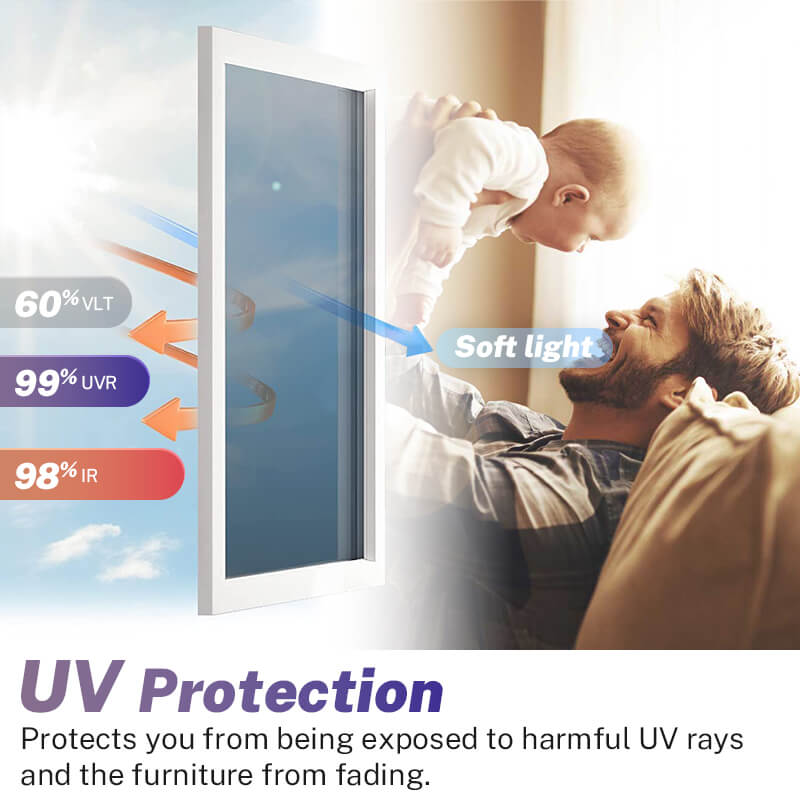In today's world of environmental awareness and energy efficiency, homeowners and businesses are constantly looking for innovative solutions to reduce their carbon footprint and improve indoor comfort. One such solution that has gained significant traction is window tinting. Beyond its traditional role of providing privacy and aesthetics, window tinting offers significant benefits in terms of thermal insulation, reduced air conditioning energy consumption, solar spectrum management and environmental friendliness. This article delves into these aspects, highlighting how residential and commercial window tinting can contribute to a more sustainable and energy efficient future.
Heat Isolation Effectiveness
The main purpose of window film is to shield against solar heat. By applying a thin film to the interior or exterior of glass surfaces, window film can significantly reduce the amount of infrared, visible light, and ultraviolet (UV) radiation entering a building. This reduction in heat transfer helps to keep your home cooler during the hot months and reduces reliance on air conditioning. Our high-quality window films are proven to block up to 98% of infrared (IR) radiation while allowing 60% visible light transmission (VLT), making them the clear choice for enhancing indoor thermal comfort.
In addition, architectural window films act as insulators during colder months by retaining indoor heat. This dual function ensures stable indoor temperatures year-round, reducing the need for excessive heating or cooling and contributing to overall energy savings.

Reduction in Air Conditioning Energy Consumption
Tinted films limit the amount of solar heat that penetrates windows. This reduces the burden on heating, ventilation, and air conditioning (HVAC) systems. This reduction in workload translates to lower energy consumption and, consequently, decreased utility bills. In fact, window tinting can lead to energy savings of up to 30%, depending on factors such as the type of film used and the building's location.
The decreased demand on HVAC systems extends their lifespan and reduces maintenance costs. This efficiency aligns with broader environmental goals by curbing the demand for energy-intensive cooling methods and reducing greenhouse gas emissions associated with electricity production.
Solar Spectrum Management
Window tinting plays a vital role in managing the spectrum of solar radiation entering a building. By filtering specific wavelengths (particularly UV and IR), window films protect occupants from harmful radiation and prevent interior furniture from fading. This selective filtering allows natural light to illuminate interior spaces without the accompanying heat generation, thereby enhancing visual comfort and reducing the need for artificial lighting during the day.
Residential Window Tinting (Residential Office Solar Control Insulated Window Film) are designed to block 99% of harmful ultraviolet rays (UVR) while allowing adequate visible light transmission. This technology ensures that interiors remain bright and welcoming without compromising energy efficiency.
Environmental Friendliness
The environmental benefits of window tinting extend beyond energy savings. By reducing the need for air conditioning and heating, window films contribute to a lower carbon footprint, aligning with global initiatives to combat climate change. Additionally, many window films are designed to block up to 99% of harmful UV rays, protecting both occupants and interior furnishings from potential damage.
The production and installation of window films have a relatively low environmental impact compared to other energy-saving measures. Their durability and longevity mean fewer replacements and reduced material waste, further enhancing their sustainability credentials.
Residential and commercial window tinting offer a multifaceted approach to enhancing energy efficiency and environmental sustainability. By effectively isolating heat, reducing reliance on air conditioning, managing the solar spectrum, and promoting eco-friendliness, window tinting emerges as a practical and cost-effective solution for modern energy challenges. As homeowners and businesses increasingly seek ways to reduce their environmental impact, investing in high-quality window tinting, such as the solutions offered by XTTF, can lead to significant long-term benefits, both economically and ecologically.
Post time: Mar-06-2025





